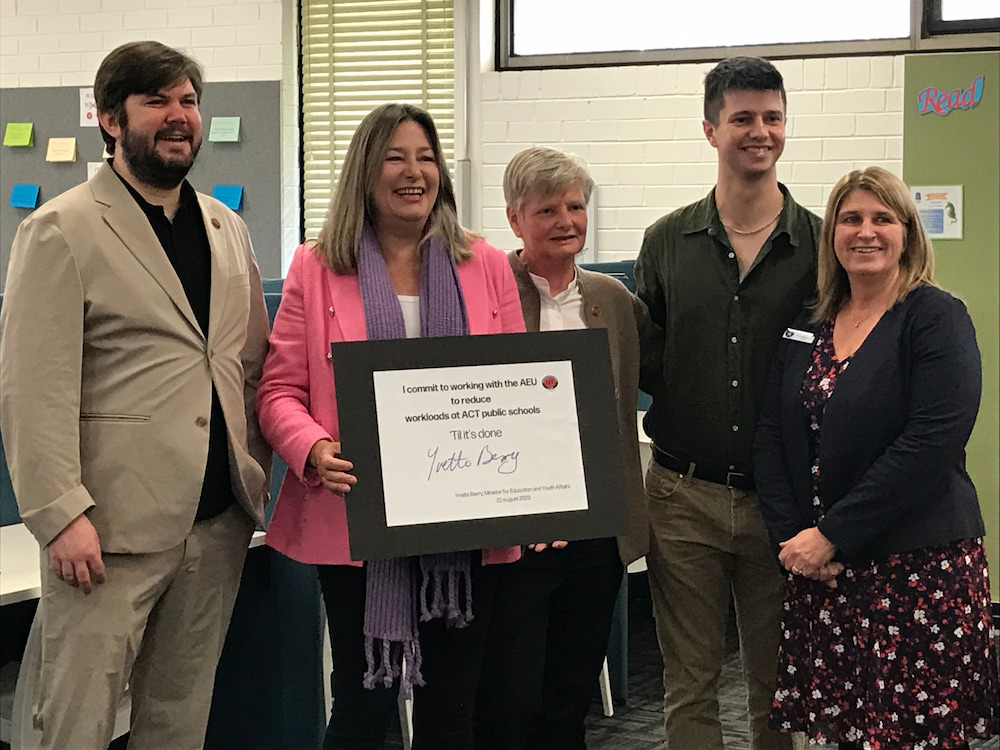Oscar Jolly, a first-year teacher at Melrose High School, came to Canberra with a $500 Volvo, a master’s degree in education, and a “real want to contribute as best as [he] possibly can to this amazing profession”. But rising living expenses have made his first year a financially difficult one.
From next month, however, he and other novice teachers will receive a 36 per cent salary increase, under the Enterprise Agreement the ACT Government signed with the teachers’ union. Teachers at higher levels will receive similar pay increases, making ACT teachers the highest paid in the country.
“I get to move from a space where I’ve had to be really thinking about my life in these two-week cycles, like many Australians out there, due to the cost-of-living crisis,” Mr Jolly said. “My pay packets go onto my food, my fuel, and my rent, and that’s about it.
“But thanks to this new agreement, I seriously get to look at my life beyond that two-week cycle. I can start thinking about saving money to buy a house. I can start thinking about starting a family. I get to think about buying a car that’s not going to break down in the next six months probably…
“Every teacher in Australia deserves that; and any worker in Australia deserves that kind of security and direction.”
The changes come into effect on 14 September. They would, education minister Yvette Berry said, “make sure that [lower-income teachers] get a wage that they can actually live on”.
When the Australian Education Union (AEU) ACT endorsed the ACT Public Sector Education Directorate (Teaching Staff) Enterprise Agreement 2023–26 in June, the branch president, Angela Burroughs, hailed it as the biggest pay increase for public school teachers in two decades, reflecting critical teacher shortages and cost-of-living pressures.
The union’s 2021 survey of ACT teachers revealed that one in three considered leaving the profession because they felt “under-staffed, under-resourced, and under-appreciated”.
Today, Ms Burroughs said: “The pay and conditions in this new Enterprise Agreement show that the ACT Government is listening to the teaching profession.” It would, she believed, attract new teachers to public schools, easing the teacher shortage.
“You could not hope for a better suite of measures than the one we have in this agreement to encourage people to come into the teaching profession,” branch secretary Patrick Judge agreed.
But to retain teachers, Ms Burroughs said, the government must address “the excessive workload” they face.
“Every day, our teachers and school leaders are doing everything that they can to meet the increasingly complex needs of students and the ever-increasing expectations of the community.”
Some students have difficulties socialising because their first experience of school was online. Others have complex mental health issues; because there are not enough school psychologists, counsellors, or youth workers, the burden of those needs falls on teachers.
“They do that because they care and they’re committed, but it comes at a cost: teacher and school leader burnout.”
Under the Enterprise Agreement, teachers will have three extra (pupil-free) staff development days, so they can begin each term with a dedicated planning and collaboration day; release time for curriculum planning, lesson preparation, assessment, and reporting (at least three hours per week) – the first time this has been introduced in the ACT; and reduced face-to-face teaching hours for new educators to facilitate enhanced support and mentoring.
A Joint Sustainable Workload Management Committee will review systems-level workload priorities and clarify the work that schools must do.
In Ms Burroughs’s opinion, teachers must have “the right to disconnect” (so they do not feel they must answer parent / student emails all weekend); centralising practices (so school leaders are not doing non-teacher work); or reducing the number of meetings. But each school would make different changes depending on their needs.
“A top-down approach is not going to be the answer,” Ms Burroughs said. “We need a cultural change in the way the teaching profession approaches its workload. At the moment, we’re churning and burning teachers.”
At her urging, Ms Berry signed a pledge to reduce workloads at ACT public schools.
“I commit myself to work with the union to implement changes to workloads that mean that teachers have the time to teach, to use their educational experiences through university and their practical experiences on the ground to give our young people the best possible start in life,” Ms Berry said.
“Recruitment and retention is important, but workload is equally an issue that we must address together. And I commit myself to do that until it’s done.”
Ms Burroughs was delighted.
“It’s just a great sign of the really positive and constructive relationship that the union has with the education minister and the Education Directorate. We believe that working constructively in partnership is a much better way to achieve positive outcomes. We’ve seen that in the success of this agreement, and this is the next step. We need a commitment ‘til it’s done’ on workload, and I’m really delighted that the minister [has signed] that pledge and [will] be on board with us to really make a difference.”



